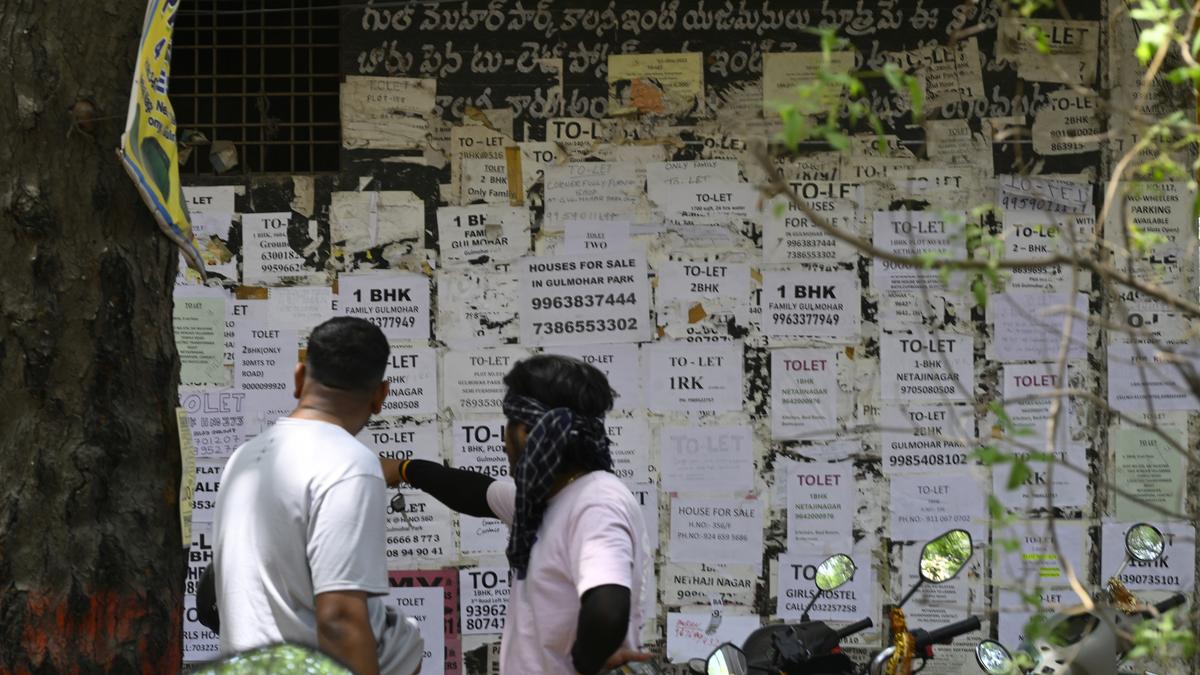Nithin Raj had already knocked on ten doors in a single month, each a potential home and another test. Outside yet another faded gate in central-east Hyderabad, hoodie pulled up against the December breeze, his chin-strap goatee and wild curls drew more attention than his modest 2BHK request. At every visit, the 31-year-old found himself reluctantly discussing his faith and appearance before even talking rent or the amenities on offer. He was searching for a place near his parents’ house so he and his fiancée could move in together after their wedding the following month.
But at each potential rental, he felt scrutinised. “It was like a visual scan. I was asked absurd questions — how often I shave my moustache and why a Christian would keep a beard. Explaining my erratic work hours as a freelance digital marketing professional was another challenge. Mentioning that my fiancée, now wife, is a graphic designer only added to the confusion. Landlords clearly expect tenants with conventional jobs,” he shares.
When he finally secured flat no. 14 in Gandhi Nagar area for ₹22,000 a month, it felt like a victory. Yet, his experience was far from unique. Across Hyderabad, prospective tenants like Nithin are routinely forced to wade through complex, unexpected, even bizarre, questions from homeowners. While he endured scrutiny over his faith and profession, others face hurdles over something as simple as their meal preferences.
Take the example of e-commerce executive Karthik Kumar, whose family discovered that their meal choice could become a battleground. “For nearly a decade, we led a double life under our own roof,” he says, smiling wryly.
Their search for a new rental in 2014 had led them to a seemingly perfect place in Madhura Nagar — a peaceful locality and well-connected. But the ‘To-Let’ board posed a challenge: “Only families and vegetarians”. The area ticked all the boxes, except for one glaring issue — they were staunch non-vegetarians. After a long discussion, the family decided to keep their dietary preference under wraps and sign the lease.
But when they went to pay the advance, the landlord caught them off-guard by grilling them about their food habits. “He asked about the intake of non-vegetarian food. He even enquired if we cook with onion and garlic. We admitted to using the latter, and thankfully, it was overlooked. However, we decided to be cautious,” the 28-year-old shares.
For the first three months, they refrained from cooking or eating non-veg food at home. “When cravings hit, we would drive to far-off restaurants, careful not to be seen by neighbours or the landlord’s acquaintances,” Karthik remembers with a smirk.
It wasn’t until a year later that they dared to cook non-veg at home — when the landlord and his family were away on a 10-day vacation. “But the fear of being caught always stayed with us. We would have incense sticks burning around the kitchen to mask the smell of spices. Ordering food online was out of the question; we couldn’t risk a delivery guy accidentally exposing us,” he adds. For years, every non-veg meal was a secret operation. Now, after a decade, Karthik’s family has finally moved into their own house in east Hyderabad. “The first thing we did after shifting was to cook a non-veg feast — openly, without fear,” he says with a laugh.
While tenants face such covert restrictions, landlords insist that their strict vetting is about ensuring financial security and neighbourhood harmony. Together, these voices expose a rental market defined less by square footage or amenities, and more by a complex web of financial safety nets, lifestyle judgments, and social conformity — one that renters must learn to navigate before they sign on the dotted line.
Caste, food and ‘fitting in’
Building on the biases that shape tenant screenings, homeowners like Rajkumar Goud in Alwal are unapologetically pragmatic. “I always ask for job details because I need to be sure the tenant can pay rent on time,” he explains. “Government employees are my first preference as they have stable incomes. With private employees or freelancers, there’s always a risk of sudden job loss, and I don’t want to chase tenants for rent.”
For Shivam T. of Marredpally, the ideal tenant is a long-term one. “It’s not just about rent,” he says. “Families usually don’t move as often as bachelors, who might shift within months. That’s why I ask about the prospective tenant’s marital status before renting out my place.”
Meanwhile, Srinivas Reddy of Begumpet avoids renting to unmarried couples altogether. “I don’t want trouble if their families disapprove of their relationship or if they part ways. It is awkward and can lead to unnecessary drama. Plus, many societies have rules against renting to unmarried couples, so I prefer to stick to the norm.”
Continuing this portrait of landlord litmus tests, another homeowner in L.B. Nagar adds, “I ask about their office location because I don’t want tenants who work night shifts and return home at odd hours. It is about maintaining peace in the apartment complex.”
For some, cultural compatibility is just as crucial. A homeowner who prefers to remain anonymous confesses, “Caste and religion matter because I want tenants who will fit in with the existing residents.”
Then there’s the precautionary approach of Ramesh Kumar, who owns a 3BHK in Malkajgiri and insists on police verification — not out of suspicion but liability concerns. “If anything happens, I don’t want to be held responsible for not checking the tenant’s background properly,” he explains.
Samhita Rao, who owns a 2BHK in Begumpet, echoes this caution: “If a tenant runs a business or a startup, I hesitate because their earnings can fluctuate. Salaried employees are a safer bet.”
Informal deals and brokered shortcuts
Across Hyderabad, many homeowners sidestep formal rental agreements to avoid taxes, preserve the flexibility to evict tenants at will and negotiate rent on their own terms. Concerns of legal entanglements, a preference for short-term tenancy and entrenched biases around caste, religion or profession only reinforce this informal ethos.
Brokers, eager to close deals quickly, often grease the wheels by steering both parties towards handshake agreements. While landlords benefit from the speed and control, tenants are left exposed — vulnerable to abrupt rent hikes, unexpected evictions and deposit disputes — turning what should be the simple search for a home into an uncertain balancing act.
Beyond these social filters, Hyderabad’s rental landscape is also being reshaped by steadily climbing prices, particularly in high-demand areas.
A recent report by ANAROCK, a leading independent real estate services company, highlights that the city’s bustling western corridor, home to major tech and business hubs, remains the epicenter of demand. Gachibowli has seen a 1% uptick in quoted rents between the third and fourth quarter of 2024, with tenants now paying anywhere between ₹30,000 and ₹41,000 per month. Kondapur saw a sharper increase of 2%, pushing rents into the ₹26,000–₹33,000 bracket.
Renters feel the squeeze
Building on these affordability challenges, Hyderabad’s rental prices in 2025 reveal a city of stark contrasts. In budget-friendly suburbs, a 1BHK in Malkajgiri goes for just ₹6,000, while a 2BHK in Karmanghat rents at around ₹11,000. L.B. Nagar’s 2BHKs start at ₹12,000, with rents climbing 3% annually, and Pragathi Nagar offers 3BHKs for about ₹23,000.
Kompally remains economical, where a 3BHK can be had for ₹22,000. Even in Chandanagar and S.R.Nagar, 2BHKs hover around ₹18,000, whereas Dammaiguda still lists them for as little as ₹8,000. Over in Manikonda and Puppalaguda, tenants pay roughly ₹20,000 for a 2BHK, inclusive of maintenance and electricity.
Shift a little closer to the central areas, and the figures rise accordingly. Himayat Nagar commands ₹25,000 for a 3BHK, while a 2BHK at a standalone gated apartment in Mehdipatnam goes for about ₹22,000. In Somajiguda, shared flats fetch ₹14,000 per room, while in Hitech City, a single room in a 3BHK costs ₹16,000.
The IT corridor remains the priciest. Kondapur’s standalone 3BHKs command ₹45,000, and gated communities push the figure to ₹50,000 plus ₹5,000 in maintenance. A fully furnished 1BHK there fetches ₹24,000, while a semi-furnished 2BHK has leapt from ₹17,000 in 2022 to ₹26,000 today. In Madhapur, 2BHKs average ₹27,000, and in Masjid Banda’s gated enclaves, rents can soar to ₹45,000. Even the vicinity around Durgam Cheruvu metro rail station isn’t spared; a 2BHK costs ₹37,000.
Gated communities in the Financial District and Nanakramguda command the steepest rents. A 2.5BHK in Financial District will set you back ₹55,000, while a 3BHK at Prestige High Fields peaks at ₹75,000. Over in Shilpa Park, 3BHKs go for around ₹56,000, and Lanco Hills tops out near ₹80,000. In Manikonda’s gated community, a 1,600 sq.ft. 2BHK rents for about ₹28,000 while in Madinaguda, a 1,100 sq.ft. 2BHK fetches ₹25,000 plus ₹2,000 maintenance.
Bachupally, Hafeezpet and their environs haven’t been spared the surge. A 2BHK in Gopalnagar costs ₹23,000, with 3BHKs at ₹32,000. In Panchavati Colony, a 3BHK has climbed to ₹35,000, even before adding ₹2,400 in maintenance. Narsingi’s gated communities offer 3BHKs for roughly ₹24,000, while Borabanda lists 2BHKs at ₹26,000. Uppal follows suit with 3BHKs at about ₹35,000.
For those eyeing standalone homes, independent 2BHKs in Koti run around ₹15,000. Even PG accommodations have felt the pinch — a three-sharing PG in Ayyappa Society now demands ₹12,000 per person.
Together, these numbers paint a picture of a market where location — and often one’s profession or background — dictates not just what you pay, but whether you can secure a home at all.
Affordability spectrum and legal gaps
Many renters are choosing the trade-off of longer commutes for more affordable rents. For some, even a short daily journey can feel draining, but for others, the promise of big savings makes the extra travel worthwhile. With rents spiraling ever upward, and no relief in sight, tenants must learn to manoeuvre a market defined by soaring prices, inflexible landlords and sudden rate hikes.
This trend dovetails with a broader cultural shift among India’s younger workforce. Over the past decade, renting has exploded, observes Sudhanshu Mishra, principal partner at Square Yards, an integrated platform for real estate. He adds that young professionals treat housing as a flexible financial decision rather than a permanent investment.
He notes that rental yields — the annual rental income as a percentage of property value — have risen from 2% to nearly 3% over the past decade, reflecting the growing preference for renting. Post-COVID, Hyderabad’s rents have jumped by almost 50%, with high-demand areas such as Gachibowli, Kondapur, Madhapur and Hitech City seeing surges up to 65%. A 2BHK in Kompally starts at roughly ₹18,900 per month, while a 3BHK in Hitech City can command as much as ₹1.08 lakh. Hyderabad’s rental landscape spans a wide spectrum, but at the lower end, compromises are unavoidable. A tenant with a ₹20,000 budget still has options; those hunting in the ₹7,000–₹8,000 bracket must lower their expectations, and truly affordable units for the economically weaker sections remain scarce.
Over the past decade, this market has transformed dramatically. Most landlord-tenant disputes are resolved informally, yet legal protections do exist under state rent control and consumer laws. What’s missing is a formal tenants’ association or an accessible, cost-effective dispute-resolution forum. Greater formalisation could strengthen safeguards on both sides, ensuring fair play when conflicts arise.
But Hyderabad’s rental story isn’t just about money and square feet — it is also a test of social acceptance. On platforms like Reddit, tenants recount landlords grilling them on caste, religion, marital status and even dietary choices. Some were quizzed about why they hadn’t started a family; others were shooed away for being non-vegetarians. Bizarre errands, mandatory tea sessions with landlords and intrusive background checks have become part of the rental ritual.
Ultimately, securing a home here means more than signing a lease — it means fitting into a landlord’s idea of an ‘ideal’ tenant. For many, renting today is less about finding shelter and more about proving they belong.
Published – April 25, 2025 08:20 am IST






